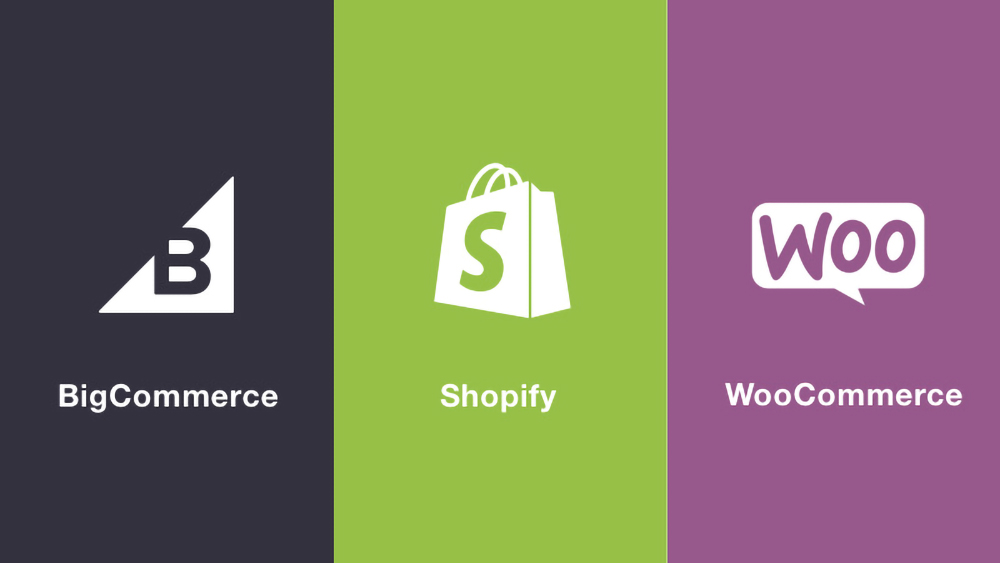E-commerce is growing rapidly, with more and more entrepreneurs setting up online stores. To succeed in this field, it is essential to choose the e-commerce platform that best suits your needs and goals. Shopify with its alternatives BigCommerce and WooCommerce are three of the most popular platforms on the market, each with their own strengths and weaknesses.
In this article, we will compare these three e-commerce giants in depth. We will examine their key features, focusing on crucial aspects such as user experience, functionality, pricing and plans offered.
BigCommerce vs Shopify vs WooCommerce : What are their key features?
BigCommerce

BigCommerce is an all-in-one e-commerce platform that allows entrepreneurs to create, manage and grow their online store without any special technical skills. It offers a wide range of customizable themes, simplified product and order management, as well as integrations with major payment and logistics services.
Shopify

Shopify is one of the most popular and easy to use e-commerce platforms. It offers a wide range of templates and apps to customize your online store and extend its functionality. Shopify is particularly loved for its ease of use and rich ecosystem of third-party apps.
WooCommerce

WooCommerce is an open-source e-commerce solution based on WordPress, making it an ideal choice for those already familiar with this content management platform. WooCommerce offers great flexibility and total control over the design and functionality of your online store, thanks to a multitude of available extensions and themes. The special thing about WordPress is that the platform is not specifically dedicated to online stores, as in the case of Shopify. With WordPress, you can create your blog, your business site and many other things.
How to choose between BigCommerce, Shopify, and WooCommerce based on your e-commerce goals ?

To select the right e-commerce platform for your needs, it is essential to determine your objectives and expectations. Here are some relevant comparison criteria to help you in your decision:
Ease of use
If you are a beginner and looking for a simple and intuitive platform, Shopify might be the best option for you. BigCommerce is also quite easy to use, while WooCommerce requires a bit more technical skills.
Customization and design
If you want full control over the look and functionality of your online store, WooCommerce is an excellent choice due to its open-source nature and compatibility with WordPress. BigCommerce and Shopify also offer many customization options, although to a lesser extent.
Budget and costs
Compare the rates and plans offered by each platform to determine which one best fits your budget. Don’t forget to factor in additional fees, such as transaction fees or costs associated with third-party applications.
BigCommerce vs Shopify vs WooCommerce : Comparison of user experience and essential e-commerce features
When it comes to creating an online store, the user experience and available features are crucial elements to consider. Each e-commerce platform offers a unique user experience and specific features to meet the needs of entrepreneurs.
Interface and handling:
- Shopify is known for its ease of use and its user-friendly interface. Users can easily add products, manage inventory and orders, and customize their store’s appearance.
- BigCommerce also offers an intuitive interface, although slightly more complex than Shopify. Beginners can still find their way around and manage their store efficiently.
- The WooCommerce interface is integrated with WordPress, which can be an advantage for those who are already familiar with the platform. However, for beginners, it can be more difficult to get the hang of WooCommerce compared to Shopify and BigCommerce.
Customization and templates
Customization and templates are essential aspects of creating an attractive and functional online store. Each e-commerce platform offers different options to customize the look of your store and extend its functionality.
Shopify
- Over 110 official themes
- 12 free themes
- Designed by professional designers
- Optimized for mobile devices
- Over 8,000 apps available in the Shopify app store
BigCommerce
- About 218 themes available
- 15 free themes
- Professionally designed themes
- Optimized for mobile devices
- Over 1200 third-party applications to extend functionality
WooCommerce
- Great flexibility in customization
- Thousands of themes available
- Thousands of extensions to extend functionality
- The quality of themes and extensions may vary
- Need to check the compatibility and support level of themes and extensions
Summary table of key features :
| Key features | Shopify | BigCommerce | WooCommerce |
|---|---|---|---|
| Interface | Very user-friendly | Convivial | Based on WordPress, more complex for beginners |
| Available themes | More than 110 | Approximately 218 | Thousands of |
| Applications | More than 8,000 | More than 1,200 | Thousands of extensions |
| Transaction fees | 0.5% to 2% depending on the plan (except for Shopify Payments) | No transaction fees | Varies by payment gateway |
BigCommerce vs Shopify vs WooCommerce : What are the pricing and plans offered?

Pricing and plans offered are important things to consider when choosing an e-commerce platform. To make it easier to compare, we’ve created a summary table of the top costs and plans for BigCommerce, Shopify, and WooCommerce.
| Platforms | Shopify | BigCommerce | WooCommerce |
|---|---|---|---|
| Pricing plans | Basic: $29/month | Standard: $29/month | Free of charge (excluding associated fees) |
| Shopify: $79/month | Plus: $79/month | ||
| Advanced: $299/month | Pro: $299/month | ||
| Transaction fees | 2% (Basic) | No transaction fees | Varies by payment gateway |
| 1% (Shopify) | |||
| 0.5% (Advanced) with external payment gateways | |||
| Additional costs | Paid applications, premium themes | Paid applications, premium themes | Paid extensions, premium themes, hosting, domain name, SSL |
Shopify and BigCommerce offer similar pricing plans, while WooCommerce is a free solution with additional costs associated with hosting, domain name and extensions. It’s important to consider all the costs associated with each platform before making your choice.
Advantages and disadvantages of BigCommerce, Shopify, and WooCommerce
| Platform | Benefits | Disadvantages |
|---|---|---|
| Shopify | User-friendly interface | Transaction fees for external payment gateways |
| 24/7 support | Additional costs (applications, themes, etc.) | |
| Many applications and themes | Some advanced features require third party applications | |
| Large user community | ||
| Integrated marketing features | ||
| BigCommerce | No transaction fees | Slightly more complex interface than Shopify |
| Integrated advanced features | Fewer apps available compared to Shopify | |
| Good scalability | Difficult to handle | |
| Wide choice of themes | ||
| Multi-channel support | ||
| WooCommerce | Free of charge (excluding associated fees) | Requires hosting, domain name and SSL certificate |
| High flexibility | Difficult to learn for beginners | |
| Wide choice of themes and extensions | Less responsive support than Shopify and BigCommerce | |
| Perfect integration with WordPress | ||
| Full control over your store |
Summary table : BigCommerce vs Shopify vs WooCommerce
To help you compare BigCommerce, Shopify, and WooCommerce e-commerce platforms, we’ve created a summary table with scores out of 5 for each feature discussed in this article. These scores are based on the aspects discussed and an overall evaluation of each platform.
| Features | Shopify | BigCommerce | WooCommerce |
|---|---|---|---|
| Ease of use | 4.8 | 4.3 | 3.8 |
| E-commerce features | 4.7 | 4.6 | 4.4 |
| Customization | 4.6 | 4.4 | 4.7 |
| Pricing | 4.4 | 4.5 | 4.6 |
| Support | 5.0 | 4.8 | 3.5 |
| Scalability | 4.8 | 4.9 | 4.7 |
| Overall rating | 4.6 | 4.4 | 4.3 |
Conclusion
Choosing the perfect e-commerce platform for your business will depend on various factors, such as your specific needs, budget, and level of expertise. BigCommerce vs Shopify vs WooCommerce each offer a unique range of benefits to meet different requirements.
Shopify shines with its ease of use, excellent customer support and rich library of apps and themes. BigCommerce stands out thanks to its advanced built-in features, scalability and no transaction fees. WooCommerce, on the other hand, is a flexible and affordable solution that integrates seamlessly with WordPress, offering absolute control over your online store.
By spending time analyzing your needs and thoroughly reviewing your options, you will be able to select the right e-commerce platform for your business, ensuring sustained growth and long-term success.
FAQ
Which is better: BigCommerce or WooCommerce?
If you’re looking for a platform with built-in advanced features and scalability without transaction fees, BigCommerce might be the best choice. If you prefer a flexible, affordable solution that is integrated with WordPress, WooCommerce would be more suitable.
What are the best features of Shopify and WooCommerce?
Shopify’s best features include its ease of use, 24/7 customer support, and extensive library of apps and themes. For WooCommerce, its strengths are its flexibility, seamless integration with WordPress and the fact that it’s free (excluding associated fees).
Should I switch from BigCommerce to Shopify?
If you’re looking for a more user-friendly interface, better customer support, or access to more apps and themes, Shopify could be a great option.
What is the difference between BigCommerce and WooCommerce?
BigCommerce is an all-in-one platform with built-in advanced features and monthly pricing plans. WooCommerce is an open-source and flexible solution, which requires separate hosting, domain name and SSL certificate, but offers full control over your online store.
